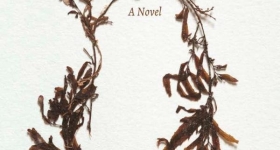Craig Santos Perez is an American Book Award-winning poet and professor at the University of Hawaii, Manoa. He is originally from Guam, a small American territory in the Pacific. Much of his work examines his identity, his homeland and the impact of American influence on the island. His latest book, from unincorporated territory [lukao],was highlighted in NPR’s “Poetry to Pay Attention To” list last year.
I spoke to Craig in San Francisco for my project on American identity.
This interview has been edited and condensed.
Arvin Temkar: Where is your home?
Craig Santos Perez: My ancestral homeland is the island of Guam. I lived in California for 15 years, so I kind of consider it my second home. And I’ve been in Hawaii for seven years so that’s my third home. I guess I have three homes.
AT: How did your family get to America?
CSP: It’s a tricky question because Guam is a part of the United States. We’re an American territory. I was born a citizen. I was always living in America, in a weird way. But my family migrated to California in 1995 on Continental Airlines.
AT: Are you proud to be an American?
CSP: I don’t really consider myself an American. Partly because Guam is what’s called an “unincorporated territory,” which is another way of saying Guam is a colonial possession of the United States. So in that sense, we’re not really Americans — but we’re also U.S. citizens. We’re not fully a part of America. So for me, personally, it’s hard to feel American, and I definitely don’t feel proud to be an American colony. Especially because the United States has had a negative impact on our island and our culture since 1898.
AT: What are some of those negative impacts?
CSP: Some of it began with land dispossession: When the United States first annexed Guam from Spain, they expropriated like half of the island’s landmass — oftentimes evicting families from land they had been on for generations, including some of my family’s own ancestral lands. And then what they did with those lands is they turned them into military bases. One of the collateral damages of that is that there’s a lot of environmental pollution due to military testing, military waste, weapons storage.
AT: If you don’t have a national identity, what would you consider your identity in terms of where you’re from or what you’re connected to?
CSP: I guess for me, first and foremost, I consider my native Chamorro identity — so as an indigenous Pacific islander. Part of my identity is also defined as being from an American territory, from an American colony.
Since I’ve been an adult I’ve been active in the Chamorro sovereignty movement as well as the decolonial and demilitarization movements both on Guam and in Hawaii.
AT: What makes poetry a powerful form for you to express and explore your identity?
CSP: For many indigenous cultures, poetry is a vessel for memory, genealogy, wisdom, ethics, politics, values, customs and identity. So I see myself writing out of this long, ancestral tradition. On a level of craft, the metaphorical, emotive, lyrical and expansive qualities of poetry help me express the complexities of identity.
AT: Tell me about your new literary series, The New Oceana Literary Series.
CSP: This is a new series with the University of Hawaiʻi Press that I proposed because there were no other publishing venues dedicated to Pacific literature in the United States. We will be publishing anthologies on different subjects related to Pacific literature, including environmentalism, LGBTQ identity, food and more.
AT: Are you doing anything else in the literary world in relation to identity or to highlight your culture/community within the larger American context?
CSP: I am writing a book of poetry that highlights Pacific culture in terms of current political and ecological issues facing us today. I am also editing an anthology exploring how the environment shapes Pacific identity and literature.
AT: Have you ever felt different from other people and why?
CSP: Most people have never heard of Guam. Most people have never heard of Chamorro people either. So I come from a place in the culture that is very small and very invisible in larger American culture. I guess that’s always made me feel different. Different in a way where I feel kind of invisible too, which is not necessarily a good feeling.
AT: Is there anything you think unites your identity with the identities of other people of this country?
CSP: I think so. I definitely feel a lot of parallels and similarities with Native American identities. I can relate a lot to the identities of other people of color, to other immigrants and migrants that have moved here. I can relate to other marginalized communities that are fighting for their rights and struggling for whatever they believe in. And then there are a lot of Americans I think that are anti-imperialist and I feel like I can relate to that as well.
AT: Do you believe that the country has your best interests in mind?
CSP: No, I do not. If you’re talking about the nation, I think the nation has its own imperial interests. The United States uses Guam as a military base. I feel like my people have been collateral damage within the national project.
AT: Who is your hero?
CSP: I would say my parents. I think they’re very brave people to have migrated to California, when they were middle aged, later in life. They worked very hard and they've definitely inspired me.
AT: How do you want people to think of you?
CSP: As a creative, passionate poet and educator and activist.










Comments